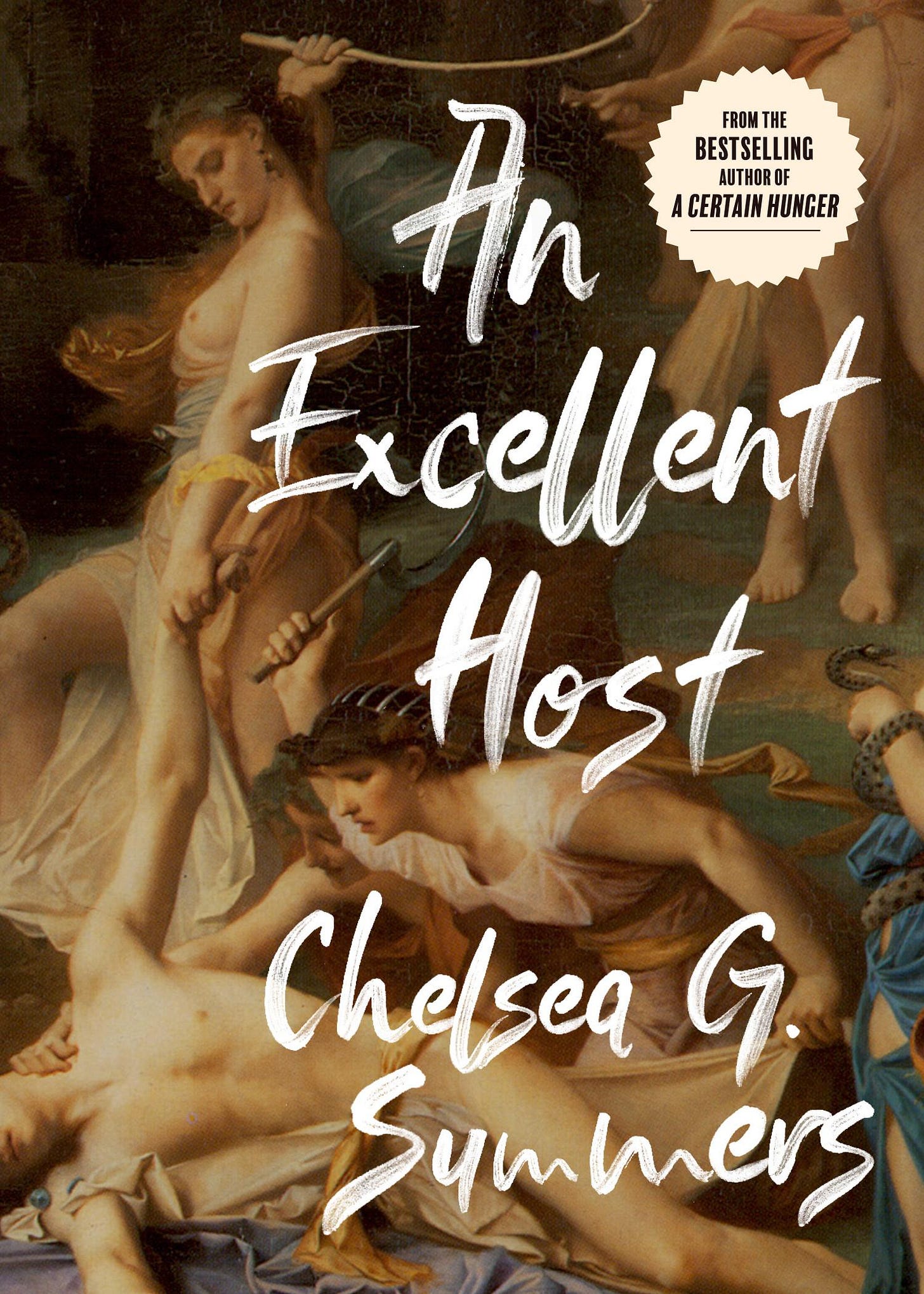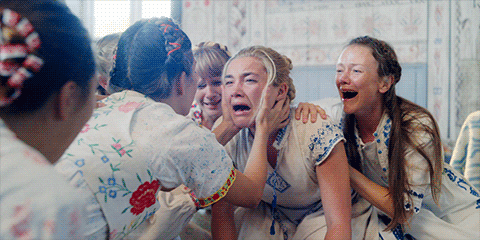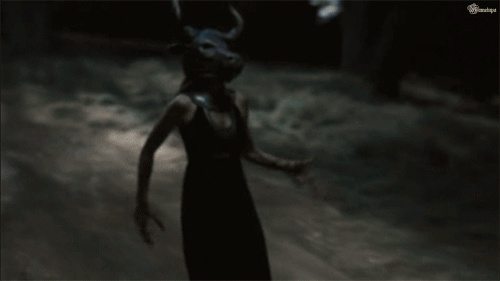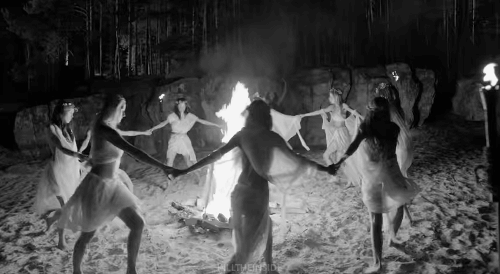You think you’ve caught a lamb, but baby, I’m the wolf. – Hay Vay
Ladies and gentlemen, the Oracle has spoken: female rage is in and she has given it its moment once again in her retelling of The Bacchae.
I was among Summers’ lucky, loyal fans to acquire and read her novella release for Indie Bookstore Day, An Excellent Host, and was delighted to find that she summoned this story of ancient tongues back into the forefront of women’s literature. Women1 writers have always been able to speak volumes with short stories and novellas. Take, for example, Kate Chopin’s The Awakening and Charlotte Gilman Perkins’ The Yellow Wallpaper. In Summers’ new oeuvre, we see a madness that rivals the stories of her predecessors.
This novella feels like the final drops of her debut novel, A Certain Hunger (ACH), being wrung out, dripping in “wine and sweat and spunk” (Summers 44). A small sexy feast for the senses, An Excellent Host has the dim-lit hedonistic imagery seen in Saltburn (2023) with the box-office breaking tones of pop feminism that made Barbie and Bella Baxter into immediate icons of white women’s empowerment right next to Dani from Midsommar (2019). Unhinged women are trending in the media; even ACH went viral on BookTok, its protagonist a charismatic multi-hyphenate: cannibal-serial-killer-food-critic. The archetype of the unhinged woman often breaks away from their expected roles by tapping into alternate realities.
Some examples (and broad generalizations):
Barbie: perfect doll/naive heroine
Bella Baxter: dependent child/independent woman
Dani: psychologically disturbed girlfriend/unphased cult queen
In the case of An Excellent Host, we have affluent city girls by day, and cannibalistic cult followers by night. These women are maenads, who in The Bacchae are man-eating devotees to Dionysus.
We have been grappling with messages from The Bacchae for over 2000 years, what makes this story relevant now?
#femalerage– it doesn't matter if you’re a Swiftie or an androgynous bisexual who exclusively listens to the Sundays and the Smiths– the women are mad and tired! Also, Summers is not only transparent about the relationship of this book to the power of Taylor Swift bringing women together across the nation, she’s rather adamant about its connection.
Our obsession with cults, specifically with women-led cults, such as the cult of Mother God and OneTaste which are in such Dionysian ways play on philosophies focused on polyamory and pleasure-pain. The stories that get popularized about women-led cults are also more often than not laced with tragedy, another feature of the Dionysian/Chthonic.
The Dionysian as Feminine + Body Horror’s ethical functions– As Camille Paglia makes clear in her complex and subversive novel Sexual Personae,
“Dionysus is the all-embracing totality of mother-cult. Nothing disgusts him, since he contains everything that is. Disgust is an Apollonian response, an aesthetic judgment. Disgust always indicates some mis-alignment toward or swerving away from the maternal" (Paglia 93).
Check out this primal, birth-like parallel from An Excellent Host:
“these women–they are everywhere, in me, on me, around me, surrounding me, fleshy and warm and wet and hot, and I am theirs...A new woman– a new woman, a huge woman, big and broad and looming, smelling like hay and blood and wild animals. I feel the world spin, wrapping me, holding me, carrying me. I am theirs, I am theirs, I am gone in a sob of sweetness” (Summers 48).
The provocation of disgust in body horror urges us to deal with the real-life implications of it. It is less likely for a man to be ripped apart by a harem of femme fatales than it is for a woman to have a botched abortion or even for a woman to be ripped apart by men. Before we go saying this kind of graphic violence against men in literature is unwarranted, let us not forget that this spectacle of sexual violence is related to the same kind of transgressive, sadistic violence that keeps Sade (who did horrifically violate and torture women IRL) in the canon of free speech. Additionally, cannibalism, which takes place in The Bacchae, also has symbolic associations with sexual violence2 and other religious practices (i.e. Catholic transubstantiation).
#MeToo has also opened up discussions about predation as well as pushed the ideas of women as predators/gender reversal into the media. Feminist rereadings and revivals of other cannibalistic women in popular media, such as Jennifer’s Body (2009), may aid in contextualizing the gore of An Excellent Host and A Certain Hunger. In the plots of these stories, the bottomless hunger for sex and violence takes center stage, signaling a bottomless mass consumption of women’s bodies both through the media and in real life.
What is at the heart of The Bacchae?
The original play is about vengeance and although the maenads were celibate, the story has also come to symbolically celebrate sexual liberation (closely linked with second-wave feminism), female rage, the Chthonian, and Nietzche’s concepts of the Apollonian and Dionysian in his Birth of Tragedy. The story of The Bacchae "suggests that any reasonably rich and complete life, sexual or social, is lived in a complex tension between control and yielding, risking always the loss of order" and also "that neat conventional polarities are inadequate to the complexities of life" (Nussbaum xxxix).3
How do we see this play out in Summers' version? How do we not?
“we gleam as poster girls for the post-Sex and the City age, living in the Sex and the City metropolis, flourishing in a bustling time of go-girl girlbosses who seem to have it all...We have 'lives,' whatever that means. The truth is that we no longer feel connected to our solo, secular selves. In the outside world, we exist in pastel washes of generalities…” (Summers 12).
Summers takes liberties in her mythological rewrite to make the maenad into a modern woman, not chaste, but in alignment with the shifting tides of nature all the same. The faceless, privileged women Summers chooses to depict as maenads are a part of our modern mythological ecosystem. Similar to the classic maenads, they seem to exist above the hoi polloi elevated and isolated in their mountains, their high-end apartments, their penthouses, their mansions, having retreated from a society where they too are subjected to move laterally despite their status and because of their gender.
I see these women all over Instagram frolicking around the urban landscape and living out their influencer careers, reaping the rewards of generational wealth, and promoting deceivingly empowered lives. They're a part of this lie that tells us that the glass ceilings have been shattered. Meanwhile, at times even the most privileged women can only swing from the chandeliers. Strangely, the myth of post-feminism is primarily pushed by white women, or Kim Kardashian, who I suppose is also a white woman. In the same vein, just as the Sex and the City girls came to resemble a carefree lifestyle not so easily liberated from their gender roles, so have the prolific images of these girlbosses with their seemingly easily attainable wealth and beauty. The fight against the patriarchy demands all of us women to engage proactively in our own unique, individual ways. Summers’ maenads are women who have succumbed to sitting pretty, the ugliness of their complacency manifesting in the rapturous brutality of their nasty repressions.
“As human women, we are irrelevantly separate, yet as spiritual congregants, we are united, reverently bound in our euphoric love of our God” (Summers 14).
In the modern day, if not Dionysus, then pop icons become the chosen object of worship affirming the ravenous intensity of visceral experience. To stare into the darkness and be seen in someone’s words and melody can allow deep parasocial relationships to develop, but more importantly, allow for cathartic, communal experiences to transpire. I have seen this and participated in it myself when I saw Lana Del Rey at Outside Lands. I became one with a sea of red, white, and blue (never thought I’d find myself in such a parade of patriotism in this political climate) dressed in soft silhouettes, ribbons, gingham, and Westernwear. We howled to the moon under the wild spell of cult fandom, entranced by the witchy visuals of our idol. Many of us wailed in song and spirit, overcome with the sublime terror of the image come alive. It was Frankensteinian, the crowd as kingmaker, watching as the iconic image of our making astounds us with its humanness. I feel Lana Del Rey to be a particularly close comparison to Dionysus (and Taylor Swift) not just in her cult following, but in her persona of owning controversy and darkness and in the insistence of her self-production, the reality of her myth-making. Many of us waited all day at her stage to come face to face with the perfect performance of our softness, our sinister feelings, and our complicated desires for vengeance.
Summers’ use of the collective, maenadic "we" highlights the shared experience of womanhood. Their banding together is sacred and their ancient doctrine of bacchanalia speaks to the age-old tale of female rage and sisterhood. We have always had strength in numbers, we have always been invisible, we have always been angered, seeking retribution, we have always been mistreated. There is always the threat of becoming dangerous when moving in masses, a mob mentality that can take over. In the Dionysian world, true hedonism comes at a price. It’s not all fun and games and ripping men apart, this act is sinister!
The ego dissolved in Dionysian unity can be wielded dangerously when one loses sight of their personal ethics. Paglia offers the following thought in response to the forces of the dissolved ego: "Dionysus expands identity but crushes individuals. There is no liberal dignity of the person in the Dionysian" (Paglia 98). Realistic instances of Dionysian rapture include, women scream-singing at a Lana Del Rey concert, but also hazing and gangrape. Institutions, orders, and organizations, in other words (and broadly speaking) Apollonian pillars of civilization are culpable in promoting rape culture and inequity by promoting a hive mentality. This is echoed in the words of the maenads, who in The Excellent Host, are the perpetrators:
“our temple is peripatetic. Modern times misunderstand us. As an order, we find ourselves out of joint, our holy worship a source of fear” (Summers 26).4
This quote describing a religion cloaked for its survival reminds me of the evolving patriarchy which, like the order of the maenads, is monstrous, predatory, and ancient. Of course, the consummation of what is monstrous and predatory results in tragedy. What follows is the irony that arises out of tragedy, which manifests in comedic truth-telling; this has not changed in the two-thousand-year storytelling of The Bacchae.
A scene in which the maenads talk about Shad, their victim, who believes he is in for nothing more than an orgy.
Philia adds, 'He's quite excited.'
"Wouldn't miss it for the world," we say.
"Be real," Chrysis says, "if you were he, would you?"
We laugh and laugh, and then we laugh some more (Summer 26).
Shad is in desperate, calculated compliance with toxic masculinity, has a traditional nice guy complex, and is a bit of a performative feminist. However, he like his parallel Pentheus in The Bacchae suffers a fate "disproportionate to his offense" (Nussbaum xxviii). While both characters are detestable, their trait of cowardice, particularly in hiding from their repressions, also makes them pitiable victims. Nonetheless, the humor lies in the fact that Shad’s lusty eagerness becomes his hamartia and ultimately, the cause of his demise. He did not anticipate that the situation could become violent, whereas most women would be in default preparation for violence at the moment of being invited to have unsanctioned sex with strangers. The humor and tragic irony in these stories reveal the Achilles’ heel of men’s hubris in addition to the Dionysian/Chthonian threat of violence that lurks around every corner.
On the Dionysian/Chthonian as an Exaltation of Flawed Feminism
“we can hardly help noticing the fact that the play does not portray the religion of Dionysus as safe or tame or civilized, even when accepted, but rather as transgressive and heartless–and yet also as necessary, beautiful, divine. This is what is hard to comprehend, and even harder not to repudiate” (Nussbaum xxxv).
Is peace restored by Shad's death? No. If peace was restored, then I don’t think I’d be writing this article.
I don’t believe An Excellent Host, nor The Bacchae are about peace. Rather, these pieces strengthen the association between women and Dionysian/Chthonian philosophies as well as convey that while for now, there seems to be an inconclusive, constant uphill battle in feminism, settling in the idea that it has concluded is much more harmful than continuing to fight. Besides, many other things that society finds worth talking about (i.e. politics, sex, religion, whether the dress is white and yellow or black and blue) are inconclusive in nature. The comparisons Summers draws between maenads and the Swifties asks yet another indeterminate, yet valuable question: pop feminism has answered to our women’s anxieties and frustrations over love and sex and sexism, but does it have the ability to uprise against in a productive way?
“In truth, feminism is flawed because it is a movement powered by people and people are inherently flawed” (Gay x).
The Dionysian is not about peace, it is about being with what is ethically murky and accepting every side of reality that is just as easily contradicted as it is proven true. Similarly, being a feminist means relinquishing some control over how you make your reparations5 and how you make the most of your ethics, which are by default imperfect and that is okay. However, accepting imperfection does not suggest total nihilism or completely refusing any accountability or responsibility for our actions just as accepting inconclusion does not mean ceasing inquiry. Conscious acceptance of imperfection and disgust within our movements stop these things to have the upper-hand from the shadows of your psyche. Part of this acceptance is noticing the heavy irony that lies in the darkness of our most well-intentioned movements, like dirty thoughts of inflicting violence on our oppressors (this can mean in feminism, but also in our attempts to unravel colonialism, racism, etc.).
Criticism is also inconclusive in nature, but that does not mean that we should stop coming to our own private conclusions, no? Criticism, the Dionysian, and feminism are inconclusive because they push us to put curiosity above all else, to continue asking questions, and to traverse uncharted territory for the sake of our individual pleasures and curiosity. Inquiry pushes innovation, it pushes us to answer with alternate realities, infinite possibilities. I’d like to leave you with an observation on the written reinterpretations of The Bacchae, echoes the message from Chimamanda Ngozi Adichie’s “The danger of a single story,” reminding us of the same closed-mindedness that keeps us from progress and pulsing with the same hope for limitless inquiry:
“An examination…shows how many-sided Dionysus and the play actually are– and shows, too, how dangerous it is to focus on only a single aspect, believing that one has uncovered the whole” (Nussbaum xxv).
•
Bibliography
Euripides, et al. The Bacchae of Euripides. Farrar, Straus, Giroux, 1990.
Gay, Roxane. Bad Feminist. Harper Perennial, 2014.
Paglia, Camille. Sexual Personae: Art and Eecadence from Nefertiti to Emily Dickinson. Yale University Press, 2001.
Summers, Chelsea G. An Excellent Host. Unnamed Press, 2024.






